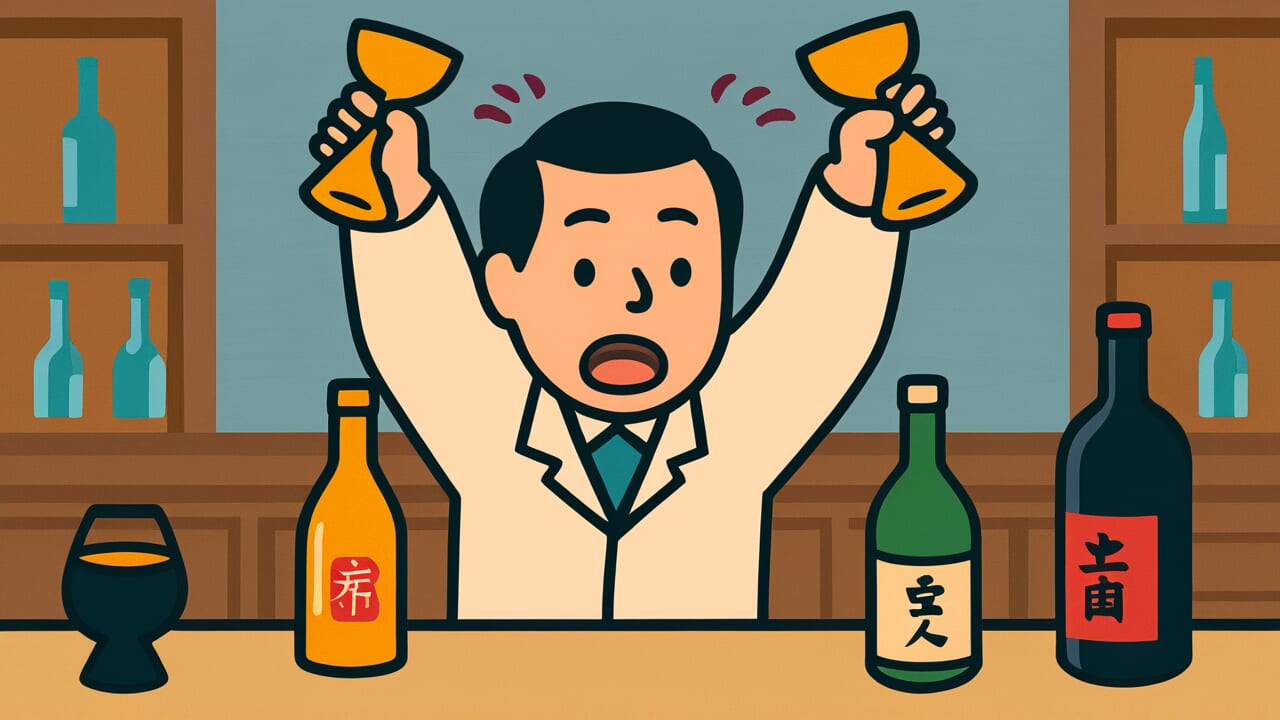How to Read “When alcohol reaches its extreme, it becomes chaos”
Sake kiwamatte ran to naru
Meaning of “When alcohol reaches its extreme, it becomes chaos”
“When alcohol reaches its extreme, it becomes chaos” means that drinking too much alcohol disrupts order and causes various problems.
Moderate drinking can ease tension and improve relationships. But when you go too far, you lose your reason.
You might say hurtful things, start fights, or cause trouble for others. This proverb warns against such behavior.
People use this saying to caution someone who’s getting too wild at a party. You can also use it to remind yourself to control your drinking.
It’s helpful when reflecting on past mistakes made while drinking. The word “extreme” shows an important lesson.
Even good things become harmful when you exceed the limit. Even today, alcohol-related troubles never stop happening.
This proverb teaches us across generations that we need self-control even during enjoyable moments.
Origin and Etymology
This proverb likely comes from ancient Chinese philosophical thought. The word “extreme” contains an Eastern philosophy concept.
It means that when something reaches its peak, it turns and moves in the opposite direction.
Since ancient times, people have enjoyed alcohol as a drink that frees the mind and relieves tension. When consumed moderately, it smooths relationships and creates a pleasant atmosphere.
But when these good effects go too far, they suddenly turn harmful. This teaching of “too much is as bad as too little” has been repeated wisdom in Japanese culture.
The use of the word “chaos” is also interesting. Instead of simply saying “problems occur,” the proverb chooses the expression “becomes disordered.”
This shows that the saying reflects a social view that values not just individual behavior but group order and harmony. You can see the historical background where behavior at banquets directly affected a person’s character and social credibility.
This proverb expresses a universal lesson about human society through the familiar subject of alcohol. Even pleasure and enjoyment need moderation.
Usage Examples
- The department head made a huge mistake at last night’s drinking party. It was truly “when alcohol reaches its extreme, it becomes chaos.”
- Even when you’re having fun, be careful not to drink too much. Remember, “when alcohol reaches its extreme, it becomes chaos.”
Universal Wisdom
Behind the proverb “When alcohol reaches its extreme, it becomes chaos” lies a universal truth about human self-control. We humans are surprisingly weak when faced with pleasure and enjoyment.
Alcohol is a mysterious drink. At first, it lightens your heart, eases tension, and brings people closer together.
But when you surrender to that pleasant feeling, you unknowingly let go of the important rudder called reason. By the time you notice, you’ve already done or said something you can’t take back.
This has been the human condition for thousands of years.
This proverb doesn’t just teach about the dangers of alcohol. Rather, it reveals a paradoxical truth that good things are the most dangerous.
Nobody approaches something they know is poison. But our guard drops around things that bring pleasure. That carelessness invites “chaos.”
Our ancestors deeply understood human nature. Having perfect self-control is difficult. That’s exactly why we need the wisdom to know our limits beforehand and draw a line.
This proverb gently yet firmly conveys the importance of trying to maintain reason. It acknowledges human weakness while encouraging the effort to stay rational.
When AI Hears This
The brain while drinking alcohol is actually in a state very similar to water at the moment of boiling. Water remains liquid up to 99 degrees, but the instant it crosses the critical point of 100 degrees, it suddenly undergoes a phase transition to gas.
The same thing happens in the brain. Up to about 0.08% blood alcohol concentration, most people can maintain a relatively stable state called “tipsy.”
But around 0.1%, the prefrontal cortex that governs reason rapidly declines in function. You become unable to control emotions and impulses.
What’s interesting is that this collapse doesn’t happen linearly but like an avalanche. The difference of one glass, just a few dozen milliliters of alcohol, can shift the entire system from “order” to “chaos.”
This is the butterfly effect in chaos theory. Small differences in initial conditions produce unpredictably large differences in results.
Even drinking the same amount, one day you end with laughter, another day with a big commotion. This happens because tiny condition differences like fatigue or hunger get amplified.
What’s more important is that after crossing the critical point, self-control stops working. The very judgment that tells you “I should stop” is lost, so you can’t stop yourself.
Once a complex system enters chaos, it can’t return without external intervention. This is the essence of “chaos.”
Lessons for Today
This proverb teaches modern people the importance of maintaining self-control especially during enjoyable moments. In modern society, we’re surrounded by various “pleasant things” beyond just alcohol.
Social media, games, shopping—all of these enrich our lives when enjoyed moderately. But when we get too absorbed, they become causes of life disruption.
What’s important is deciding your own “limit” beforehand. You can’t make calm judgments while you’re enjoying something. That’s why you draw a line before you start.
This is the courage to acknowledge weakness and the wisdom to protect yourself.
It’s also important to gently speak up when someone around you seems about to go too far. You can use the phrase “When alcohol reaches its extreme, it becomes chaos” to convey the message.
It doesn’t sound preachy and can even include humor. This ancient wisdom still shines today to protect both yourself and the people you care about.
Enjoyment colors our lives. That’s exactly why we want to maintain a good relationship with it.



Comments